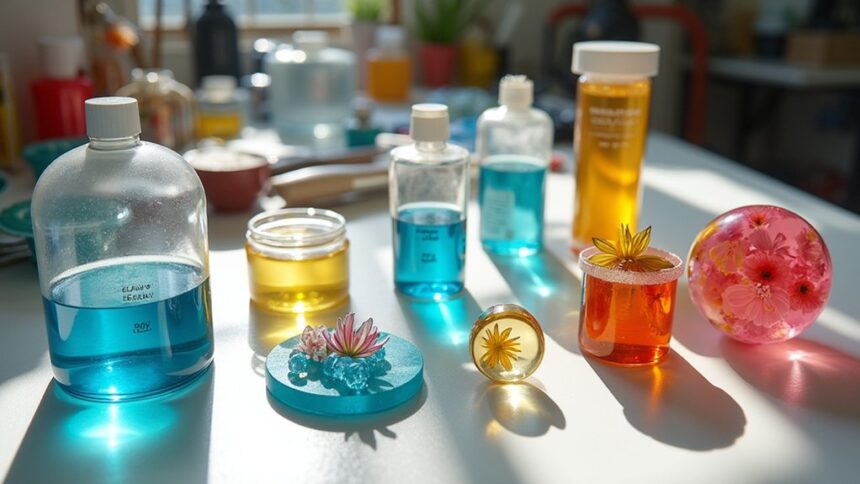Choosing the right resin for crafting depends on your project’s needs. Epoxy resin works great for durable items like coasters and jewelry, while casting resin’s low viscosity is perfect for deep pours and embeddings. UV resin cures quickly under light for small projects, and polyurethane offers flexibility for outdoor items. Consider working times too – from UV resin’s minutes to epoxy’s hours. The perfect formula awaits in the magical world of resin possibilities!
Key Takeaways
- Epoxy resin offers durability for coasters and jewelry, with non-toxic options available for kitchen items.
- Casting resin’s low viscosity makes it ideal for deep pours and embedding objects with a 30-40 minute working time.
- Coating resin creates glossy protective layers on surfaces, perfect for thin applications with 20-30 minutes of working time.
- UV resin cures quickly under UV light without mixing, making it convenient for small jewelry and decorative projects.
- Polyurethane resin provides flexibility for weather-resistant outdoor projects but requires careful handling due to its 5-10 minute cure time.
Types of Resin for Crafts: Which Formula Is Best for You?
When diving into the colorful world of resin crafting, how do you know which type will bring your creative vision to life? Each resin formula has unique superpowers! Epoxy resin stands out for durability in projects like coasters and jewelry. For those deep pour epoxy river tables that make everyone say “wow,” casting resin‘s low viscosity is your best friend. Need a glossy finish for tabletops? Coating resin creates a protective layer that’ll make your artwork shine! In a hurry? UV resin zaps to perfection with minimal curing time—perfect for last-minute gifts! Outdoor resin project in mind? Grab some polyurethane resin, the tough guy that laughs at weather. Remember to always ensure proper ventilation when working with resin to avoid inhalation of fumes. The right resin for pouring depends on what amazing creation you’re dreaming up!
Understanding Epoxy Resin: Properties and Applications
As crafters plunge into resin work, epoxy resin stands out as the superstar of the resin family! This versatile material comes as a two-part system that transforms from liquid to solid in just 24-72 hours, creating a super durable, chemical-resistant finish that’s hard to beat.
Clear epoxy resin comes in different formulations for specific uses. Casting resins flow easily (thanks to low viscosity) making them perfect for deep molds and encapsulating treasures like flowers or photos.
Craft those beautiful memories forever with casting resin—it flows like a dream into your deepest molds!
Coating epoxy, with its thicker consistency, works wonders for surfaces like tables and artwork. Both types deliver that eye-catching glossy finish crafters go crazy for!
The best part? Many epoxies are tested for non-toxicity, so they’re safe for projects like coasters and kitchen items.
Just mix, pour, and watch the magic happen! Additionally, UV resistance is a crucial feature to consider when choosing an epoxy resin, as it helps maintain the clarity and vibrancy of your art projects over time.
Polyurethane Resin: When Flexibility Matters
Unlike its rigid cousin epoxy, polyurethane resin brings incredible flexibility to the crafting table! This two-component wonder creates a rubber-like finish that bends without cracking, making it perfect for projects that need to move or flex.
Crafters love polyurethane resin for creating molds, prototypes, and flexible parts that stand up to wear and tear. Its strong adhesion keeps everything together, while its amazing weather resistance means your outdoor creations will last through rain or shine!
The curing process happens in just hours (not days!), allowing for quicker project turnaround and less waiting around. Just watch out for moisture while it’s hardening—too much humidity can mess things up!
For crafters who need their creations to bend without breaking, polyurethane resin is the stretchy solution!
UV Resin: Quick-Curing Solutions for Small Projects
In the fast-paced world of crafting, UV resin stands out as the impatient crafter’s dream come true! This amazing material transforms from liquid to solid in just minutes when exposed to ultraviolet light, perfect for those who can’t wait to see their creations come to life.
| Feature | Benefit | Best Uses |
|---|---|---|
| Quick-curing | Results in minutes | Jewelry making |
| No mixing needed | Fewer mistakes | Decorative items |
| Stays liquid until UV exposure | Easy adjustments | Encapsulating objects |
Unlike other resins, UV resin requires no messy measuring or mixing of components. Simply apply it, make any needed adjustments to your design, and then expose to UV light! Just remember to work in a well-ventilated area, as safety matters just as much as the incredible clarity of your finished projects.
Polyester Resin: High Strength for Specialized Crafts
Polyester resin shines in the world of automotive repairs, where its impressive strength can fix dents and bond parts together better than many alternatives.
In marine applications, this resin’s exceptional water resistance makes it perfect for boat repairs and watercraft projects, standing up to constant moisture exposure without breaking down.
When combined with fiberglass, polyester resin creates incredibly durable composites that can withstand serious stress and impact, making it the go-to choice for surfboards, kayaks, and other tough outdoor equipment.
Automotive Repair Uses
When cars get damaged, many crafters and DIY enthusiasts turn to polyester resin for quick fixes. This versatile material shines in automotive repairs thanks to its incredible high strength and durability, making it perfect for bodywork and fiberglass applications that need to withstand road vibrations and weather exposure.
Repair enthusiasts love polyester resin’s quick curing time—most projects harden within hours, getting vehicles back on the road fast! It’s also budget-friendly compared to epoxy alternatives, which explains why both professionals and weekend warriors choose it for their projects.
Safety first, though! Always use proper ventilation when working with this resin. Those strong fumes aren’t joking around, and smart DIYers always wear protective gear while creating their automotive masterpieces.
Marine Application Benefits
Strength and durability make polyester resin a champion in marine environments where constant exposure to water demands superior materials. This tough material bonds exceptionally well with fiberglass components, creating watercraft that can handle rough seas and harsh sun. Boat builders love how polyester resin cures quickly, allowing them to finish repairs and new builds in record time!
| Marine Benefit | Why It Matters |
|---|---|
| Water resistance | Prevents damage from constant moisture |
| High strength | Withstands impacts and rough conditions |
| UV protection | Resists breaking down in sunlight |
| Affordable | Costs less than other marine-grade resins |
| Quick curing | Speeds up boat building projects |
Remember though, when working with polyester resin, always guarantee proper ventilation! The fumes can be pretty intense during the curing process, but the durable finish is totally worth the extra safety steps.
Fiberglass Reinforcement Power
Fiberglass mats transform into superhero-strong materials when paired with the right resin partner! Polyester resin grabs onto these mats like a best friend, creating structures that are lightweight yet tough enough to withstand serious pressure.
This dynamic duo is the secret weapon behind many automotive applications and water-loving marine projects.
The curing process happens relatively quickly—just a few hours and you’re ready to roll! Plus, polyester resin is an affordable option compared to fancy epoxy, making it perfect for big projects that would otherwise break the bank.
Just remember: this powerful resin releases some pretty intense fumes while it works its magic. Always use proper ventilation and safety equipment, or your craft session might turn into an unwanted science experiment!
Matching Resin Types to Your Project Requirements
Choosing the right resin for your craft project can feel like finding the perfect dance partner – they need to match your style and tempo perfectly! Different resin types have unique personalities that shine in specific applications. Casting Resin is your go-to buddy for deep pours, while Coating Resin struts its stuff with a glossy finish on tabletops. For super-quick projects, UV Resin jumps in with its lightning-fast cure time under special lights! When working with resin, maintaining a stable curing temperature around 70°F is essential for achieving the best results.
| Resin Type | Best For | Working Time |
|---|---|---|
| Casting Resin | Deep molds, embeddings | 30-40 minutes |
| Coating Resin | Thin layers, tabletops | 20-30 minutes |
| UV Resin | Jewelry, small repairs | Until UV exposure |
| Polyurethane | Weather-resistant projects | 5-10 minutes |
Safety Considerations When Working With Different Resins
The creative magic of resin comes with a serious side – safety must always be your crafting companion!
When working with different resins, especially epoxy and polyester types, protection is non-negotiable. Always wear safety gloves and a respirator to prevent skin irritation and protect your lungs from exposure to fumes that can make breathing difficult.
Safety isn’t optional with resin art – your skin and lungs deserve proper protection every crafting session.
Your workspace should be well-ventilated – open those windows and get those fans spinning! Following the manufacturer’s instructions about mixing ratios and curing times isn’t just about getting good results; improper mixing can leave sticky spots that are both messy and potentially harmful.
Don’t forget protective eyewear! Resin splashes happen to even the most careful crafters.
And remember to store your resin in a cool, dry place – sunlight and heat are total resin-ruiners!
Keep a first aid kit accessible in case of accidents and know the location of emergency eye wash stations.
Frequently Asked Questions
Which Resin Is Best for Health?
Water-based resins pose fewer health risks and resin allergies compared to others. Non-toxic options like NatuResin minimize respiratory effects and skin contact concerns during long-term exposure when used with proper safety precautions.
What Is the Environmentally Friendly Resin for Crafts?
NatuResin offers eco-friendly alternatives among biodegradable resin options. This plant-based resin features low VOC formulations, making it ideal for sustainable craft supplies. Its non-toxic resin choices minimize environmental impact while utilizing renewable material sources.
What Is the Best Resin to Use for Crafts?
The best resin depends on specific applications. Epoxy resin offers versatility for art projects, while UV resin suits jewelry making with quick curing times. Casting resin excels in mold making, and polyester resin provides strong adhesive properties.
How Do I Know What Type of Resin to Use?
Crafters should select resin types based on project suitability, considering curing time, heat resistance, clarity levels, color options, mixing ratios, application techniques, storage tips, and safety precautions for best results.
Conclusion
Choosing the right resin for your craft projects isn’t just about grabbing whatever’s on sale. Each type—epoxy, polyurethane, UV, and polyester—has its own superpowers and quirks! By matching the resin to your specific project needs and always following safety guidelines, you’ll create amazing, long-lasting pieces that wow your friends. Remember, the perfect resin is out there waiting for your creative touch!


Leave a Reply